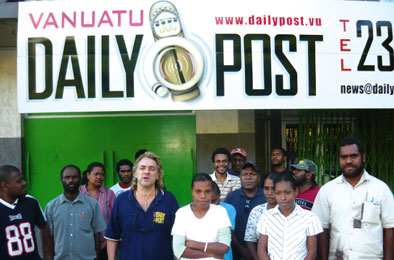
Despite strong sentiment among media people in the Pacific that censorship is harming the quality of news, divisions run deep between former colleagues and co-workers about the best way to move ahead in the fight for media freedom.
AUCKLAND: Freedom of the press may be taken for granted in many Western countries, but in some Pacific nations it is a far-off ideal. Although Fiji is the only country to have recently enshrined news control into law with the Media Industry Development Decree, other media people in the Pacific have experienced draconian sanctions on their reporting.
Vanuatu Daily Post publisher Marc Neil-Jones has had many run-ins with authorities.
“In my time in Vanuatu I have been thrown into jail, assaulted many times, had numerous threats and been deported,” he says.
“I was badly assaulted 18 months ago.”
The assault came after Neil-Jones published an editorial about the Director of Correctional Services, blaming him for prison escapes and the burning down of the prison.
“Since my assault I have had health issues and am not writing much, taking a managerial role,” he says.
There are others who have suffered similar fates. Russell Hunter, development editor with the Samoa Observer used to be publisher of the Fiji Sun before he was deported from Fiji in February 2008.
'Tipped off'
“I had been tipped off that it was likely to happen, but I was angry at the manner in which it was done,” says Hunter.
Hunter’s deportation followed the Fiji Sun’s allegations in 2008 that former Prime Minister Mahendra Chaudhry had evaded tax. The government accused Hunter of attempting to destabilise the country and a three-man panel cleared Chaudhry of any wrongdoing.
In an interesting twist, Chaudhry was in front of the court again last month in Suva on charges of money laundering, tax evasion and providing false information to the Fiji Islands Revenue and Customs Authority (FIRCA).
“He's charged using exactly the information Victor Lal and I published in the Sun,” says Hunter.
However, other journalists believe in a more measured approach when dealing with media restrictions. William Parkinson, managing director of Communications Fiji Limited, who runs Fiji Village and a host of radio stations, does not see the point of clashing heads with those in control.
“The restrictions are pretty clear and we would obviously prefer not to have them but we have to deal with the situation at hand,” he says.
“Responsibility to our listeners and to our shareholders comes first. Getting shut down would not serve anyone’s purpose.
“Martyrdom is tempting in this situation and it may earn you international glory and invites to lots of conferences but it is pointless if you are off the air.”
Reality check
These sentiments were shared recently in a speech by Stanley Simpson, news director of Fiji Broadcasting Corporation, who runs Radio Fiji. Speaking to the first Pacific Media Partnership Committee meeting in Nuku’alofa, Tonga, Simpson said:
“There have been many academic and philosophical guidelines thrown at us …but there is also the other thing called reality.
“In Fiji, we are dealing with the reality. That is why – while I may not agree with the decisions being made by some media organisations in Fiji, I will never criticise their decision.”
It seems that despite the struggles of reporting in a censored environment, many media people simply do what they can. Their concern to remain in a compromising situation outweighs the argument in favour of removing themselves completely from the environment.
However, there is little consensus among them about the right approach to take.
Among multiple associations of journalists in the Pacific, the latest to arise was the Pasifika Media Association, or PasiMA. Headed by the editor-in-chief of the Samoa Observer Savea Sano Malifa, the association was formed in Apia by journalists critical of the stance of PINA, which has chosen to remain in Fiji.
Hunter helped in the formation of PasiMA and is a founding board member.
PINA 'lost its way'
“PINA has lost its way and is beyond rescue. I've seen no recent reason to alter that view,” he says.
Hunter is critical of the fact that Matai Akauola, PINA manager and training co-ordinator, has been appointed to Fiji’s Media Industry Development Authority, in order to represent the interests of the media.
“The fact that PINA's head of secretariat has accepted appointment to the body that will fine or possibly jail journalists in Fiji says it all far more eloquently than I can,” he said.
While not actively involved with PasiMA, Neil-Jones has had a running debate with PINA president Moses Stevens (pictured) about independence from the Fiji regime.
Neil-Jones says Stevens is a “failed politician who likes being in the news.”
“He is being foolish thinking Bainimarama will listen to him and he is putting PINA into an embarrassing position by allowing its regional Pacnews to be compromised by censorship,” he says.
“He constantly harps on about the need for media to improve how they write and balance news which is a typical government line.”
Open letter
But Stevens has hit back at Neil-Jones, accusing him of “using his newspaper to discredit other people” and “pushing his own agendas.” In an open letter on PINA’s website, He blames Neil-Jones for not understanding the Fiji situation.
“I think Neil-Jones has failed to find out the reasons behind the military coup in Fiji to start off with,” he says.
Stevens compared the current situation in Fiji to that of Vanuatu in the 1980s. After independence in 1980, governments had tight control of the media. Stevens says there were deportations, assaults and that newspapers were closed.
“These things did not represent good governance and democratic principles at all in the normal sense, or a free media environment for that matter.
“The Fiji situation is no different to the Vanuatu experience.”
“The Vanuatu government…understood the power of media, and the damage it could cause on the ‘transitional’ process of moving away from the colonial governments and building up the new nation that had just been born.”
The problem for media organisations and companies that continue to operate in Fiji is that they are labelled as supporters of the regime, no matter what stance they actually take.
Tagged media
“In a very divided environment every media organisation has been tagged either as anti-government or pro-government – whether they like it or not,” Simpson says.
Simpson is saddened by the approach by international media to describe Fiji Broadcasting Corporation as "state controlled" or "military controlled".
“This is insulting to the hard work being done by FBC journalists to deliver news to the people of the country,” he says.
“The FBC may be owned and partly funded by the state – but the newsroom has remained independent throughout the changes in governments in Fiji over the last decades.”
Simpson says that he expected the regime of censorship to stop once the decree was in place, but he was wrong.
“We were informed that the censorship would be lifted once the media decree came into force – but it seems that censorship has remained while some of the structures of the media decree are being set up.”
However, Simpson is also not crying foul over the elements of the decree, and puts them into perspective.
Decree guidelines
“The guidelines are almost word for word from the media code of ethics that was put in place by the Fiji Media Council well before the 2006 events,” he says.
Parkinson still sees much value in reporting, as long as the media are not adopted as a propaganda arm of the regime.
“Obviously there is a point that you cross when news coverage is not just censored but it is directed by those in power,” he says.
“I don’t believe we have reached that stage yet in Fiji.
“If we were forced to become a propaganda arm of the Government therefore no longer able to offer credible news coverage for our listeners then we would need to review our position on providing news services.”
However, Neil-Jones believes that more can and should be done to allow Fijian journalists to say what they think.
“There needs to be an outlet for Fijian journalists to report under pseudonyms through a regional news network to report what is happening,” he said.
“This cannot happen with PINA as censors are there. If journalists feel they are protected, they will report sensitive issues without fear.”
Lack of unity
Despite his support of PasiMA, Neil-Jones doesn’t see the effectiveness of multiple bodies with different points of view.
“Regional media must be united in their criticism over what is happening in Fiji and condemn it as a regional body.”
However, Stevens defends PINA’s decision to stay in Fiji, saying it has a crucial role to speak to the government and convince it that media freedom is necessary in any democratic model put in place by the promised 2014 elections.
“Media freedom can only be embraced and enjoyed in the Pacific when everyone in the society including governments and other stakeholders, have a better understanding of the media and how to use the media effectively in enhancing good governance,” he said.
Hunter is also calling for greater education in ethics and on the job training but believes that media freedom is still the main issue for Pacific media.
With so many groups representing different views, he is suspending his judgment pending practical outcomes.
“I'm aware of the various organisations who claim to stand for various things,” he said.
“Let's judge them by what they achieve.”
As debate continues around the Pacific, broadcasters like Simpson and Parkinson are busy and hard at work.
“At the FBC – the position we continue to reiterate is to stick and abide stronger than ever to the foundation principles of journalism – fairness, balance and accuracy,” says Simpson.
“We also constantly remind ourselves who we are here to serve – the people of Fiji – and what kind of information it’s important they get.”



